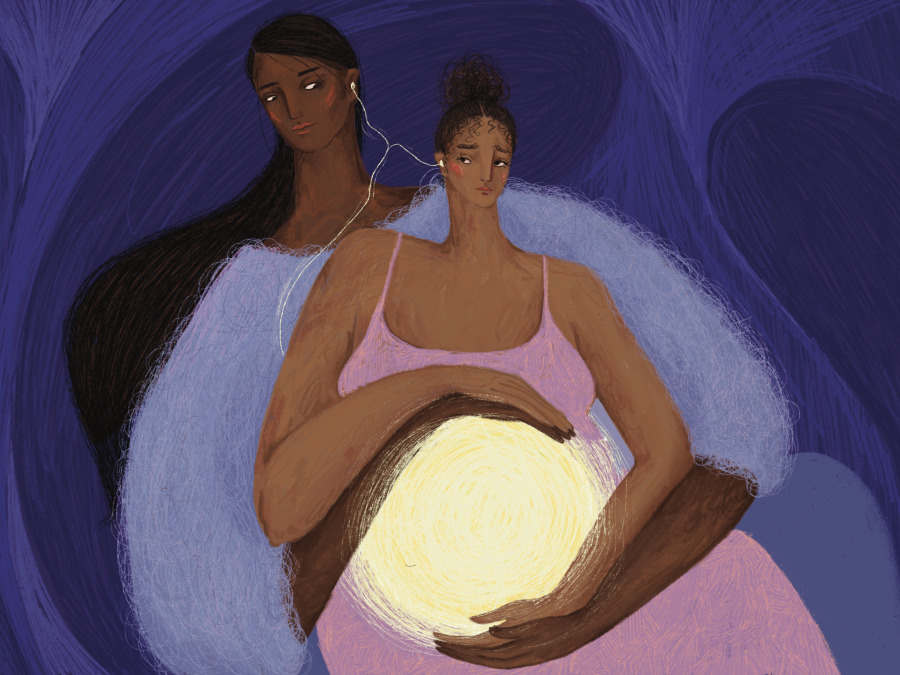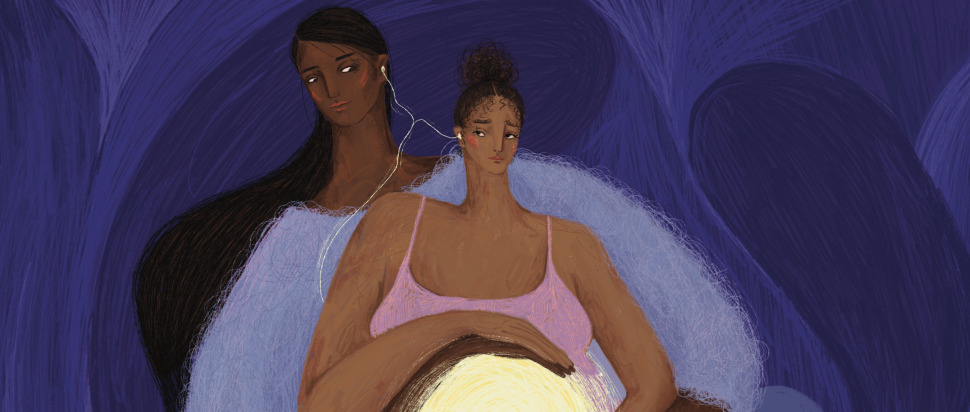With Parent & Child: Unpacking the role of doulas and birth companions
With March bringing World Doula Week, we speak to doulas and birth companions practising in Scotland about supporting pregnancy, bringing life into the world, and the need for systemic change
“At the very core, the role of a doula is that of serving. Of serving birthing people and their families,” says Sara Ferreira-Jeffries, a practising doula for six years. Ferreira-Jeffries has found a passion for childbirth and pregnancy, through which she offers individualised care. “Everyone is different and everyone has a different story.”
Before, during, and after birth – doulas and birthing companions offer care throughout every step of the pregnancy journey. It’s an intimate role; doulas give informational, emotional, and practical support. As Ferreira-Jeffries says; “Every baby deserves to come into this world surrounded by love and care.” A smile stretches into her voice: “And every parent deserves to be surrounded by love and support when they have their babies, because they are newborn parents as well.”
When Fiona Reilly’s friend was expecting a child, she began training as a doula; when the time came around, Reilly was able to support her friend’s birth and she’s been a doula ever since. “I recommend that people meet a number of doulas, so they find the one that is the best fit for them. We're not everyone's cup of tea,” she says. For Reilly, it’s important to stress that doulas do not provide medical support. “We simply support the wishes of the family.”
Through their practice, doulas can offer the additional support that the NHS is not currently able to provide. “I think the big gap is continuity of carer,” continues Reilly. While one doula accompanies you throughout your pregnancy journey, many birthing people will be seen by multiple midwives over the course of nine months. “There are many studies that show that having someone you have built a relationship with alongside you on your birthing journey has many positive benefits.” As the NHS currently stands (or, crumbles) such continuity is myth-like. Workers are overworked and underpaid. Appointments are shorter; waiting lists are longer.
For NHS staff themselves, these rushed relationships may also be disappointing. As Ferreira-Jeffries notes, “I think midwives often would love to have that relationship with the families, but they're not really given the opportunity.”
Misconceptions of doulas are fairly common. “It's either like a middle class trend or it’s a hippie trend – one of the two, right? It's really important to clarify that that's not the case. You know, we do support people from all backgrounds, with all preferences,” says Ferreira-Jeffries. As such, like many doulas, she offers multiple payment plans and sliding scale prices to best accommodate a range of financial situations.

Illustration by Ione Rail.
Ferreira-Jeffries is also a member of Doulas Without Borders, a UK-wide network of volunteers offering support to birthing and childbearing people. The organisation focuses its support on those experiencing disadvantage – for instance, those experiencing homelessness and displacement, as well as survivors and victims of domestic or sexual violence. “It’s really being there for those people who would normally not be able to access doula support because often doula support is a private support.”
The necessity of personalised support for marginalised groups is increasingly recognised. Established in May 2019, Amma Birth Companions is a Glasgow-based charity which supports birthing people from migrant backgrounds and other underserved groups during pregnancy, childbirth, and early parenthood. Amma’s services are expansive: what began as a companionship programme now entails peer support, antenatal education, and infant feeding support. “It's an incredible privilege as well, to be with them during that time and to support them,” says Maree Aldam, CEO of Amma. Bringing individuals together during a pivotal period in their lives, the charity seeks to foster local community for those about to enter early parenthood. After all, it takes a village.
Parenthood can be isolating – sleepless nights coupled with those long well-milked and nappy-changed days. And pregnancy itself – its changes, its challenges – is no mean feat. Doing it alone is far from easy, especially while experiencing other hardships. “We're providing the kind of support I suppose that a doula [would], for those who are fortunate enough to be able to hire a doula privately,” explains Aldam. “And for many others, we're providing a kind of support... almost akin to what a partner might provide in that situation.”
For Amma, advocacy is an integral act of care. The charity’s 2024 Birth Outcomes and Experiences report found that, in 2021-22, 39% of 100 Amma clients required an interpreter; issues with interpreting were recorded in 74% of these cases. Many instances of discriminatory practices were also noted. Unfortunately, however, such findings were expected: medical racism is rife. As found by the 2021 MBRRACE report, Black and Asian people have a greater risk of maternal mortality in the UK when compared to white people. With a birthing companion in the room, the hope is that greater care is offered by medical staff. Systemic change is crucial.
Agency is not a given when it comes to our bodies and reproduction – tightening abortion laws and inaccessible contraception are testament to this. Having an advocate – someone who will stand in your corner, stay there – during pregnancy is invaluable, especially for marginalised groups. In such instances, the care that doulas and birthing companions can offer is a radical act – and all newborn parents deserve the very best.
